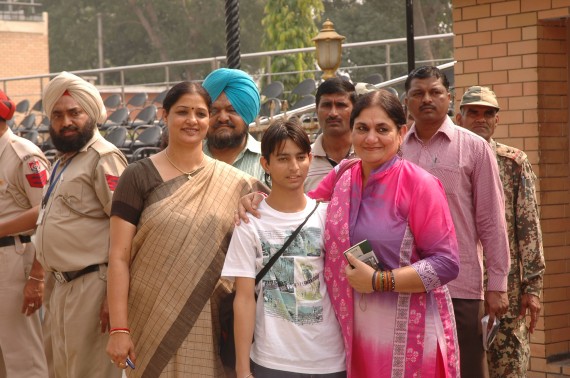
Indian Prisoner Sarabjit Singh killed in Pak Jail
Sarabjit autopsy shows clear motive of murder: Doctors
By Rashmi Talwar
AMRITSAR May 3, 2013———— “Sarabjit was attacked by multiple people, with the clear motive of murder” commented Dr Gurmanjit Rai, HoD Department of Forensic Medicine, Government Civil Hospital, Patti District and heading the five member team to conduct post-mortem, formed on the
instructions of the Punjab government.He commented during a press conference here today, after the team conducted the second post mortem, on Sarabjit Singh- the Indian prisoner attacked in a Lahore jail, who succumbed to his grievous injuries yesterday.
“There were six to seven injuries on Sarabjit’s head caused by heavy blunt objects, hit multiple times by more than one person in multiple attacks and it is being presumed by whatever viscera we could collect that the cause of death could be due to head injury. “Yes the object of attack could be bricks!” the doctor admitted.
“The injuries are 6-7 days old and the time of death 00.45 am May 2, 2013 is correct, but the one-page Death certificate sent by the Jinnah Hospital’s medical board in Lahore, Pakistan is quiet insufficient.” And added, “Sarabjit was a healthy, tall person and it was not possible that the attacker could have been only one!”
Answering a query Dr Rai explained that in medical lingo, the organs of the deceased Sarabjit were considered ‘not present’ and were wrongly mentioned as ‘missing’. “We have found clear cut incisions and roots of the organs of the heart, the stomach, gall bladder and both
kidneys.” This is a routine exercise in the first post mortem, that organs from the body are removed for forensic and other examinations. Since the heart and other organs cannot be cut in parts the whole has to be sent for examinations, he explained.
The post mortem in India was done on other organs -spleen, brain, lungs and overall body. There is also suspicion that severe head injury may have been the cause of death and not a cardio pulmonary
arrest as mentioned in the death certificate, the doctor stated.
Other than the brutal head injury causing skull fractures Sarabjit’s body bore wounds of fractured ribs including ribs number 3,4,5 with fractures in three on the left side and two on the right side, while the central bone to which the ribs are attached was also found fractured, as also the ‘mandible’ or the jaw bone.
There were dark bruises on the back of his shoulders, lips, left ear and left side of the head. Some stitched wounds were also found. In answer to whether the treatment to the deceased was proper the doctor said -“We are awaiting treatment records and want to see what medicines and other treatment was imparted to him”.
India would await the report from Jinnah Hospital Lahore, Pakistan to conclusively arrive at the final answers for Sarabjit’s custodial killing. The reports of the second post mortem would be sent to the Ministry of External Affairs(MEA).
URL: http://www.sify.com/news/sarabjit-autopsy-shows-clear-motive-of-murder-doctors-news-national-nfdsxcdgcfc.html
00000000000000xxxxxxxxxxxxx000000000000000000000000

Pak’s Chishty versus India’s Sarabjit
By Rashmi Talwar
AMRITSAR, May 3, 2013 ———-
When Dr Mohammad Khalil Chishty, was discussed at the lunch meeting between Prime Minister Manmohan Singh and Pakistan President Asif Ali Zardari during the latter’s one-day India visit to pay obeisance at Ajmer Sharief , in early April on a Sunday, a wheelchair bound Prof Chishty’s case was not only expedited but was also released, soon after.
Zardari had urged the Indian PM to follow up the case of Dr Chishty, an 80-year-old Pakistani virologist, accused in a brawl that killed one person while Dr Chishty was on a visit to meet his ailing mother in India. The doctor had pleaded innocence. Chishty was booked in 1991, almost the same time as India’s Sarabjit in Lahore, Pakistan.
Chishty’s trial took 18 years. In year 2010, he was awarded life-imprisonment for murder. An appeal in the High Court was rejected, while he did get bail, his passport was impounded and he was forced to stay in Ajmer for nearly two decades, the 80-year-old Pakistani scientist was allowed to return to Karachi by the Supreme Court of India in May last year after a more than 20-year-long legal battle. For many years Dr Chishty lived alone in his ancestral home near Ajmer in Hatundi growing frail and suffering heart attacks and finally had to be put on a wheelchair. When Chishty was to be released, Hope elevated about Sarabjit’s release in exchange, on the forthcoming Diwali that year.
“But our PM did not do anything to affect that exchange and gave Pakistan its Chishty without any returns or even assurances of release of Sarabjit” cried Dalbir Kaur, sister of Sarabjit who had fought for years to secure her brother’s release from Pak prison and who succumbed to the murderous attack in Pak Jail.
“All hopes were dashed when Chishty’s wheelchair strolled down the Radcliff line separating the two neighbours, to his home country, Pakistan, without any one bringing back Sarabjit” and added –“ The entire Bhikhiwind village was euphoric and hopeful that an exchange would take place . But nothing happened! While Zardari managed to bring back his Pakistani citizen to his country our PM’s voice was too weak to be given any weightage by a minion country like Pakistan.”
“You (government of India) failed to protect your citizen…They (Pakistan) got (Pakistani scientists Dr Chishty freed.” Dalbir accused a mum PM.
http://www.sify.com/news/pak-s-chishty-versus-india-s-sarabjit-news-national-nfdwbHadiig.html?source=sifyhome&slot=c1s2#disqus_thread
Sarabjit was sent to Pak by RAW :Hindustan Times
31.630890
74.871552


















Recent Comments